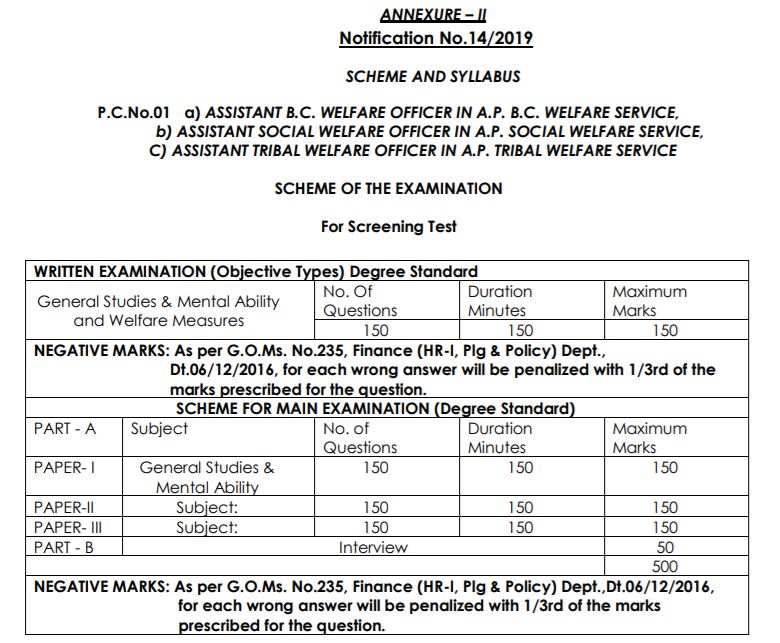APPSC Gazetted Officer Syllabus 2021 PDF Download Exam pattern Here: Applicants who are all going to prepare for the APPSC Gazetted Officer Examination kindly read this entire article. In this article, We have provided the entire syllabus and exam pattern for Gazetted Officer Post. the APPSC Gazetted Officer Exam Date has not yet been announced by the officials. Candidates who want to score good marks in the examination kindly start preparing for your exam soon. additionally, We have inserted the direct download link for the syllabus and the official website link below. Candidates go through the article for any quires.
APPSC Syllabus 2021 PDF – Details

| Organization | Andhra Pradesh Public Service Commission (APPSC) |
| Post Name | Gazetted Officer |
| Category | Syllabus |
| Syllabus | Available Now |
| Job Location | Andhra Pradesh |
| Official website | psc.ap.gov.in |
APPSC Gazetted Officer Selection Process 2021
The Selection Process will be based on
- Main Exam
- Screening Test.
APPSC Gazetted Officer Exam Pattern 2021
| WRITTEN EXAMINATION (Objective Types) Degree Standard | |||||||
| General Studies & Mental Ability and Welfare Measures | No. Of Questions | Duration Minutes | Maximum Marks
|
||||
| 150 | 150 |
150
|
|||||
| NEGATIVE MARKS: As per G.O.Ms. No.235, Finance (HR-I, Plg & Policy) Dept., Dt.06/12/2016, for each wrong answer will be penalized with 1/3rd of the marks prescribed for the question | |||||||
| SCHEME FOR MAIN EXAMINATION (Degree Standard) | |||||||
| PART – A | Subject | No. of Questions | Duration Minutes | Maximum Marks | |||
| PAPER- I | General Studies & Mental Ability | 150 | 150 | 150 | |||
| PAPER-II | Subject: | 150 | 150 | 150 | |||
| PAPER- III | Subject: | 150 | 150 | 150 | |||
| Part-B | Interview | 50 | |||||
| 500 | |||||||
| NEGATIVE MARKS: As per G.O.Ms. No.235, Finance (HR-I, Plg & Policy) Dept.,Dt.06/12/2016, for each wrong answer will be penalized with 1/3rd of the marks prescribed for the question | |||||||
APPSC Gazetted Officer Syllabus 2021 PDF
SECTION-I
GENERAL STUDIES AND MENTAL ABILITY:
- Events of national and international importance.
- Current affairs- international, national, and regional.
- General Science and its applications to the day-to-day life Contemporary developments in Science & Technology and Information Technology.
- The social-economic and political history of modern India with emphasis on Andhra Pradesh.
- Indian polity and governance: constitutional issues, public policy, reforms and e-governance initiatives with specific reference to Andhra Pradesh.
- Economic development in India since independence with emphasis on
Andhra Pradesh. - Physical geography of Indian sub-continent and Andhra Pradesh.
- Disaster management: vulnerability profile, prevention and mitigation strategies, Application of Remote Sensing and GIS in the assessment of Disaster.
- Sustainable Development and Environmental Protection
- Logical reasoning, analytical ability, and data interpretation.
- Data Analysis:
a) Tabulation of data
b) Visual representation of data
c) Basic data analysis (Summary Statistics such as mean, median, mode, variance, and coefficient of variation) and Interpretation - Bifurcation of Andhra Pradesh and its Administrative, Economic, Social, Cultural, Political, and Legal implications/problems.
SECTION-II
SOCIAL AND CULTURAL HISTORY OF ANDHRA PRADESH AND WELFARE PROGRAMMES:
- Social and Cultural History of Andhra Pradesh: Geographical Features of Andhra – Its
Impact on History and Culture – Pre-History – The Satavahanas, Ikshvakus – SocioEconomic and Religious Conditions – Literature, Art and Architecture – The Eastern Chalukyas of Vengi – Society, Religion, Telugu Language, Literature, Art and Architecture. - Various kingdoms that ruled Andhra Pradesh between the 11th and 16th Centuries A.D
Socio-Cultural and Religious conditions in Andhradesa between 11th to 16th Centuries A.D, Growth of Telugu Language, literature, Art, Architecture and Painting. - The advent of Europeans- Trade centers- Andhra under the Company– 1857 Revolt and its impact on Andhra- Establishment of British Rule- Socio-Cultural awakening, Justice party/self-respect movements- Growth of Nationalist Movement in Andhra between 1885 to 1947– Role of Socialists– Communists– Anti- Zamindari and Kisan Movements. Growth of Nationalist poetry.
- Origin and growth of Andhra movement- Role of Andhra Mahasabha’s- Prominent Leaders- Events leading to the formation of Andhra State 1953. Role of News Papers in the Andhra Movement.
- Events leading to the formation of Andhra Pradesh State – Visalandhra Mahasabha – States Reorganization Commission and Its Recommendations – Gentlemen Agreement – Important Social and Cultural Events between 1956 and 2014.
- Priorities of State Government for the welfare and Economic Development of SC
PAPER-III
GENERAL OVERVIEW OF THE INDIAN CONSTITUTION AND WELFARE AND PROTECTION MEASURES FOR WEAKER SECTIONS
- Nature of the Indian Constitution – Constitutional Development – Salient features of Indian Constitution – Preamble – Fundamental Rights, Directive Principles of State Policy and their relationship – Fundamental Duties, Distinctive features – Unitary and
Federal. - Structure and functions of Indian Government- Legislative, Executive and JudiciaryTypes of Legislatures- Unicameral, Bicameral- Executive – Parliamentary, JudiciaryJudicial Review, Judicial Activism.
- Distribution of Legislative and Executive Powers between the Union and the States; Legislative, Administrative and Financial relations between the Union and the States– Powers and the Functions of Constitutional Bodies- UPSC, State Public Service
Commissions, CAG, and Finance Commission. - center-state relations- Need for Reforms- Rajmannar Committee, Sarkaria Commission, M.M. Punchchi Commission – Unitary and Federal features of Indian Constitution.
- Community Development Programs- Balwantray Mehta, Ashok Mehta Committees73rd and 74th Constitutional Amendment Acts and their Implementation.
- Indian Political Parties- National, Regional- One Party, Bi-Party, Multi-Party Systems Regionalism, and Sub-Regionalism–Demand for New States – Sri Krishna Committee – National Integration- Threats to Indian Unity.
- Constitutional provisions for the upliftment of SC/ST. Welfare Mechanisms in India provisions for Scheduled Castes, Tribes & Minorities, Reservations for SCs, STs and Backward classes – Prevention of SCs and STs Atrocities Act- National & State SCs, STs & BCs Commissions, Women’s Commission, National, and State Minorities Commissions – Human Rights Commission – RTI- Lokpal & Lok Adult
- Legislative Acts for eradication of Social evils and practices
SYLLABUS FOR MAIN EXAMINATION:
- ASSISTANT B.C. WELFARE OFFICER,
- ASSISTANT SOCIAL WELFARE OFFICER,
- ASSISTANT TRIBAL WELFARE OFFICER
PAPER –I
GENERAL STUDIES AND MENTAL ABILITY
- Events of national and international importance.
- Current affairs- international, national, and regional.
- General Science and its applications to day-to-day life Contemporary developments in Science & Technology and Information Technology.
- The social-economic and political history of modern India with emphasis on Andhra Pradesh.
- Indian polity and governance: constitutional issues, public policy, reforms and e-governance initiatives with specific reference to Andhra Pradesh.
- Economic development in India since independence with emphasis on Andhra Pradesh.
- Physical geography of Indian sub-continent and Andhra Pradesh.
- Disaster management: vulnerability profile, prevention and mitigation strategies, Application of Remote Sensing and GIS in the assessment of Disaster.
- Sustainable Development and Environmental Protection
- Logical reasoning, analytical ability, and data interpretation.
- Data Analysis:
a) Tabulation of data
b) Visual representation of data
c) Basic data analysis (Summary Statistics such as mean, median, mode, variance, and coefficient of variation) and Interpretation - Bifurcation of Andhra Pradesh and its Administrative, Economic, Social, Cultural, Political, and Legal implications/problems.
PAPER-II
SOCIAL AND CULTURAL HISTORY OF ANDHRA PRADESH AND WELFARE PROGRAMMES
- Social and Cultural History of Andhra Pradesh: Geographical Features of Andhra – Its Impact on History and Culture – Pre-History – The Satavahanas, Ikshvakus – SocioEconomic and Religious Conditions – Literature, Art and Architecture – The Eastern Chalukyas of Vengi – Society, Religion, Telugu Language, Literature, Art and Architecture.
- Various kingdoms that ruled Andhra Pradesh between 11th and 16th Centuries A.D Socio-Cultural and Religious conditions in Andhradesa between 11th to 16th Centuries A.D, Growth of Telugu Language, literature, Art, Architecture, and Painting.
- The advent of Europeans- Trade centers- Andhra under the Company– 1857 Revolt and its impact on Andhra- Establishment of British Rule- Socio-Cultural awakening, Justice party/self-respect movements- Growth of Nationalist Movement in Andhra between 1885 to 1947– Role of Socialists– Communists– Anti- Zamindari and Kisan Movements. Growth of Nationalist poetry.
- Origin and growth of Andhra movement- Role of Andhra Mahasabha’s- Prominent Leaders- Events leading to the formation of Andhra State 1953. Role of News Papers in the Andhra Movement.
- Events leading to the formation of Andhra Pradesh State – Visalandhra Mahasabha – States Reorganization Commission and Its Recommendations – Gentlemen Agreement – Important Social and Cultural Events between 1956 and 2014.
- Priorities of State Government for the welfare and Economic Development of SC/ST’s.
PAPER-III
GENERAL OVERVIEW OF THE INDIAN CONSTITUTION AND WELFARE AND PROTECTION MEASURES FOR WEAKER SECTIONS
- Nature of the Indian Constitution – Constitutional Development – Salient features of Indian Constitution – Preamble – Fundamental Rights, Directive Principles of State Policy and their relationship – Fundamental Duties, Distinctive features – Unitary and Federal.
- Structure and functions of Indian Government- Legislative, Executive and JudiciaryTypes of Legislatures- Unicameral, Bicameral- Executive – Parliamentary, JudiciaryJudicial Review, Judicial Activism.
- Distribution of Legislative and Executive Powers between the Union and the States; Legislative, Administrative and Financial relations between the Union and the States– Powers and the Functions of Constitutional Bodies- UPSC, State Public Service Commissions, CAG and Finance Commission.
- center-state relations- Need for Reforms- Rajmannar Committee, Sarkaria Commission, M.M. Punchchi Commission – Unitary and Federal features of Indian Constitution.
- Amendment Process to the Constitution – Centralization Vs Decentralization – Community Development Programs- Balwantray Mehta, Ashok Mehta Committees73rd and 74th Constitutional Amendment Acts and their Implementation.
- Indian Political Parties- National, Regional- One Party, Bi-Party, Multi-Party Systems Regionalism and Sub-Regionalism–Demand for New States – Sri Krishna Committee – National Integration- Threats to Indian Unity.
- Constitutional provisions for the upliftment of SC/ST. Welfare Mechanisms in Indiaprovisions for Scheduled Castes, Tribes & Minorities, Reservations for SCs, STs and Backward classes – Prevention of SCs and STs Atrocities Act- National & State SCs, STs & BCs Commissions, Women’s Commission, National, and State Minorities Commissions – Human Rights Commission – RTI- Lokpal & Lok Adult
- Legislative Acts for eradication of Social evils and practices (Refer Official Notification)
Download APPSC Gazetted Officer Syllabus PDF 2021 – Click Here (Available Now) ![]()

